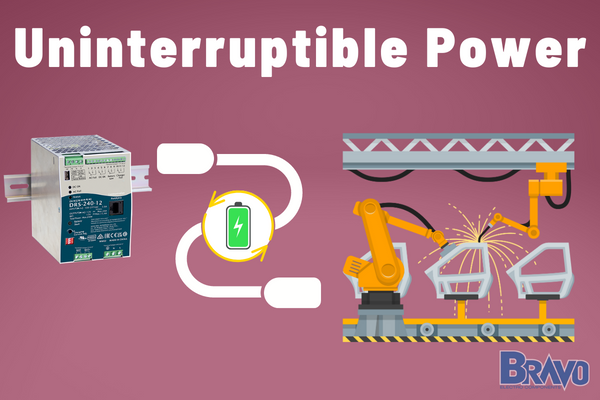
Picture this: You're in an industrial setting. Sophisticated machinery humming, critical systems are operating at peak performance, and all gears are in motion to deliver excellent results. Unexpectedly, there's a total system shutdown. A power interruption has just transformed a thriving production line into a sudden standstill.
This is the exact moment where an Uninterruptible Power Supply (UPS) could have been the hero. But what is an uninterruptible power supply? And more specifically, what does an uninterruptible power supply do?
Let's delve into this essential equipment and discover its significance in our daily operations.
What is an Uninterruptible Power Supply?
An uninterruptible power supply is a device that leaps into action when the main power source falters. It ensures an uninterrupted flow of supply voltage, offering a lifeline against unpredictable power disruptions. These disruptions can harm delicate equipment and hamper crucial operations, creating a cascade of problems.
The UPS, however, serves as a vigilant guardian, ensuring your activities remain undisturbed. Be it a significant event depending on continuous power supply, a critical industrial process, or essential medical equipment – a UPS stands guard, securing your operations against unforeseen power issues.
But to appreciate its role fully, we need to delve deeper and ask: what does an uninterruptible power supply do?
What Does an Uninterruptible Power Supply Do?
A UPS is more than just a backup power source. It is a multi-functional device that protects your systems from various power-related issues. It defends your equipment against power surges, brownouts, and total blackouts.
Such power-related problems can wreak havoc on sensitive electronic equipment. For instance, in a hospital, a momentary power outage can cause significant, life-changing disruptions.
Similarly, industrial processes reliant on stable power can incur substantial financial losses during power outages. In these situations, a UPS mitigates the risk, ensuring a constant power supply and protecting against potential disasters.
How Does An Uninterruptible Power Supply Work?
When it comes to the broader picture, the part played by an uninterruptible power supply is pivotal. Its primary role is to perpetually scrutinize the inbound power. Upon detecting any disturbances in the power flow, it swiftly switches from the main power source to its internal reservoir.
This brings up an essential question - is household electricity AC or DC? In fact, household electricity is typically AC, not DC. The UPS, however, is capable of quickly transitioning to its internal DC power source during an outage. This changeover is executed so rapidly that the operations of connected devices remain unaffected, preserving their continuity.
So when we consider this subject, it all comes down to this: a UPS provides an uninterrupted power supply, maintaining a seamless operation of all connected devices.
Examples of UPS Use Cases
Real-world scenarios best answer the question: what does an uninterruptible power supply do? In the healthcare sector, a UPS guarantees that vital equipment functions persistently, possibly making the difference between life and death.
And in the industrial realm, where we often find our power supplies mounted on racks, a UPS system can avert costly downtime and maintain the seamless operation of crucial equipment.
Think of an event illuminated by LED lighting. A power glitch could plunge the entire venue into darkness. But with a UPS in place, the power remains uninterrupted, preventing any unexpected interruptions. Also, a common issue with LED lighting is driver failures. However, with a UPS, LED driver troubleshooting becomes less of a concern since the power supply remains consistent.
Let's also consider the role of a UPS in data centers. Here, vast amounts of critical data are stored and processed on servers, which are sensitive to power fluctuations. A brief power outage or even a minor voltage fluctuation can cause servers to fail, leading to potential data loss and significant downtime.
Do I Really Need an Uninterruptible Power Supply?
Deciding whether you need an uninterruptible power supply involves assessing the potential impact of a power disruption on your operations.
If the stakes are high and a power outage could lead to substantial damage or loss, the importance of a UPS becomes evident. It becomes a vital piece in your set-up, guarding your systems against unpredictable power fluctuations and outages.
On the contrary, if your operations can withstand occasional power disruptions without dire consequences, then other power management solutions might be a better fit. Evaluating your power supply needs, understanding bad power supply symptoms, and knowing how long power supplies last are key steps in this decision-making process.
However, keep in mind that while some operations can survive without a UPS, the potential loss caused by a sudden power outage may still outweigh the cost of investing in a UPS. Even with the best power supplies, there's always a risk of a power outage, and a UPS provides a reliable safeguard against such instances.
What Size Uninterruptible Power Supply Do I Need?
So what power supply do I need? Or more specifically, what size uninterruptible power supply do I need? In order to determine this, consider your power supply specifications and power supply sizing. You must assess the power requirements of all your equipment. Remember, the UPS must be able to support all connected devices during a power outage.
Each piece of hardware connected to the UPS will have a specific power demand, often indicated as Watts (W) or Volt-Amps (VA) on the device or in its manual.
Consider the power demand of every device that will be connected to the UPS, from major machinery to smaller peripherals. Add up the power requirements of all these devices to calculate your total power need. This sum will give you a baseline for the capacity that your UPS needs to have in order to provide adequate backup during a power outage.
Bear in mind that oversizing your UPS, i.e., choosing a unit with a much higher capacity than you currently require, could lead to unnecessary costs. Not only will you pay more upfront for a larger unit, but the operational costs may also be higher as these units often consume more energy.
Conversely, undersizing your UPS or choosing a unit with a capacity that falls short of your equipment's power needs could lead to insufficient protection when you need it most. If a power outage occurs and your UPS cannot support all connected devices, some may shut down abruptly, leading to potential data loss or hardware damage.
Other Factors to Consider When Finding the Right UPS
Aside from size, several other factors can influence your decision when selecting a UPS.
- Your device’s power type: Knowing the difference between AC and DC power and the type of power your equipment uses can determine the type of UPS you need. While household electricity is primarily AC, some devices might require DC power. In this case, an uninterruptible power supply that can convert AC to DC might be necessary.
- Regulated vs unregulated power supply: Your choice of UPS can be influenced by whether you need a regulated or unregulated power supply. While a regulated power supply can provide a constant output voltage despite variations in the input voltage or load, an unregulated power supply might not offer the same level of consistency.
- Run Time: How long do you need your equipment to stay operational during a power outage? The run time is usually related to the battery capacity of the UPS. If you require a longer run time, you may need a UPS with a larger battery or the ability to add external battery packs.
- Form Factor: Do you need a UPS that fits in a server rack, or would a tower model be more suitable? The physical dimensions of the UPS can be an important consideration, especially in space-constrained environments.
- Remote Management Capabilities: Some UPS units offer network connectivity and remote management features. This could allow you to monitor and control the UPS remotely, which could be beneficial in large or complex IT environments.
- Surge Protection and Filtering: Aside from power backup, some UPS units also provide additional surge protection and noise filtering features. These can help protect your equipment from power surges and electromagnetic (EMI) or radio-frequency interference (RFI).
- Environmental Factors: Considerations such as the operating temperature, humidity levels, and dust can affect the UPS's performance and lifespan. Be sure to choose a UPS that's suited to the specific conditions of your environment.
- UL listed power supplies: The UL Listing mark is an important consideration when selecting a UPS. It signifies that the product has been tested by Underwriters Laboratories, an independent safety certification company, and that it meets their stringent safety standards.
Navigating through these considerations might seem daunting, but the rewards in terms of operational continuity and equipment protection are worth the effort. It can also provide opportunities for learning - for example learning how to repair power supplies can be a valuable skill in maintaining your UPS.
Wrapping Up Our Beginner’s Guide to UPSs
Having explored what an uninterruptible power supply is and what it does, we can see how essential a UPS can be in providing continuity during power disruptions. Whether it's protecting against power supply failures, reducing downtime, or safeguarding sensitive equipment, a UPS plays an instrumental role.
In the grand scheme of things, an uninterruptible power supply ensures the seamless operation of various systems, enhancing their longevity and efficiency. With the right UPS - be it an AC DC power supply, a 12 volt power supply, a 24 volt power supply, or a 48 volt power supply - you can protect your valuable equipment and ensure your operations continue undisturbed, even during unexpected power outages.
At Bravo Electro, we understand that different operations require different types of power supply solutions. We offer a variety of power supplies including enclosed power supply for protection from environmental factors, open frame power supply for greater customization and flexibility, and DIN rail power supply for easy installation in industrial settings.
For businesses looking for scalable solutions, a modular power supply is an excellent choice, allowing for the addition or removal of modules to meet changing power requirements. If portability and ease of use are crucial for your operations, consider an external power supply.
Your choice will depend on your specific needs, the type of equipment you use, and the power supply efficiency rating you require.
So, whether you're overseeing intricate industrial operations, managing life-saving medical equipment, or maintaining any other high-stake systems that require constant power, understanding what an uninterruptible power supply does empowers you to make a well-informed decision about the optimal power protection solution for your specific needs!
After you’re done shopping, check out our insightful post on the topic how long do power supplies last.







